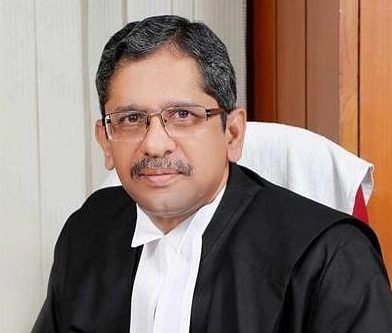New Delhi: In July 2021, as the country was slowly overcoming from the tragedies caused by the second Covid wave, several people approached the Supreme Court seeking permission to hold Rath Yatra rituals in various parts of Odisha.
Chief Justice Ramana, noting the havoc of Covid-19, refused to permit the performance rituals at places other than Puri, while giving a hope to people that, “God (Jagannath) will allow us to hold rituals next year”. This was only one of the several Odisha-related cases Chief Justice Ramana heard during his tenure of 16 months, which also saw recommendations of 11 judges to Orissa High Court.
Chief Justice Ramana, who is set to retire Friday, also gave a hope of strong judiciary to citizens of the country when he prevented Narendra Modi government from appointing Rakesh Asthana as CBI director, which Modi government desperately wanted, soon after taking over as the 48th Chief Justice of India in April 2021.
The hope was of adjudication of numerous vital cases pending before the top court. It was believed that with a longer tenure of 16 months at the helm, Chief Justice Ramana would hear prominent cases like petitions against Citizenship Amendment Act, abrogation of Article 370 in Jammu and Kashmir, challenge to electoral bonds, hijab ban case and UAPA among others. But none of these significant cases could see the light of day in the Supreme Court during his tenure.
Petitions against the Jammu and Kashmir Reorganisation Act 2019, which divided erstwhile J&K into two Union Territories, were filed in the Supreme Court in August 2019. The petitioners argued that the decision to nullify Article 370 was unconstitutional as it could not have amended without the concurrence of J&K Constituent assembly. The case was last heard in 2020. Though, it was mentioned before the bench of the Chief Justice for early hearing in April this year but the SC didn’t take up the matter during Justice Raman’s tenure.
Same was the fate of the petitions against Citizenship Amendment Act, which was enacted in 2019 December by the BJP government at the Centre and have provisions to grant citizenship to non-Muslim migrants from Afghanistan, Bangladesh, and Pakistan. The petitions termed the act unconstitutional and in violation of Article 14 of Constitution. The case was last heard in January 2020.
The petitions challenging the Unlawful Activities Prevention Act (UAPA) was last heard in 2019. The petitioners argued that the act provides unbridled powers to the government and violates the freedom of speech.
The petitions against electoral bonds scheme, launched by Union government in 2018, were last heard by the Supreme Court in 2020. The petitions argued that electoral bonds have opened doors to unlimited political donations, even from foreign companies, which can have serious repercussions on the Indian democracy. It was contended that the electoral bonds are legitimizing electoral corruption at a huge scale, while at the same time ensuring complete non- transparency in political funding.
Chief Justice NV Ramana, however, a day before demitting the office heard petitions against Pegasus snooping row. The Chief Justice, though, did not pass any order in the case. He also issued notice to the Gujarat government on the petitions challenging remission of 11 convicts who gang raped Bilkis Bano and killed several people during 2002 Gujarat riots.
Kuldeep Singh, OP
